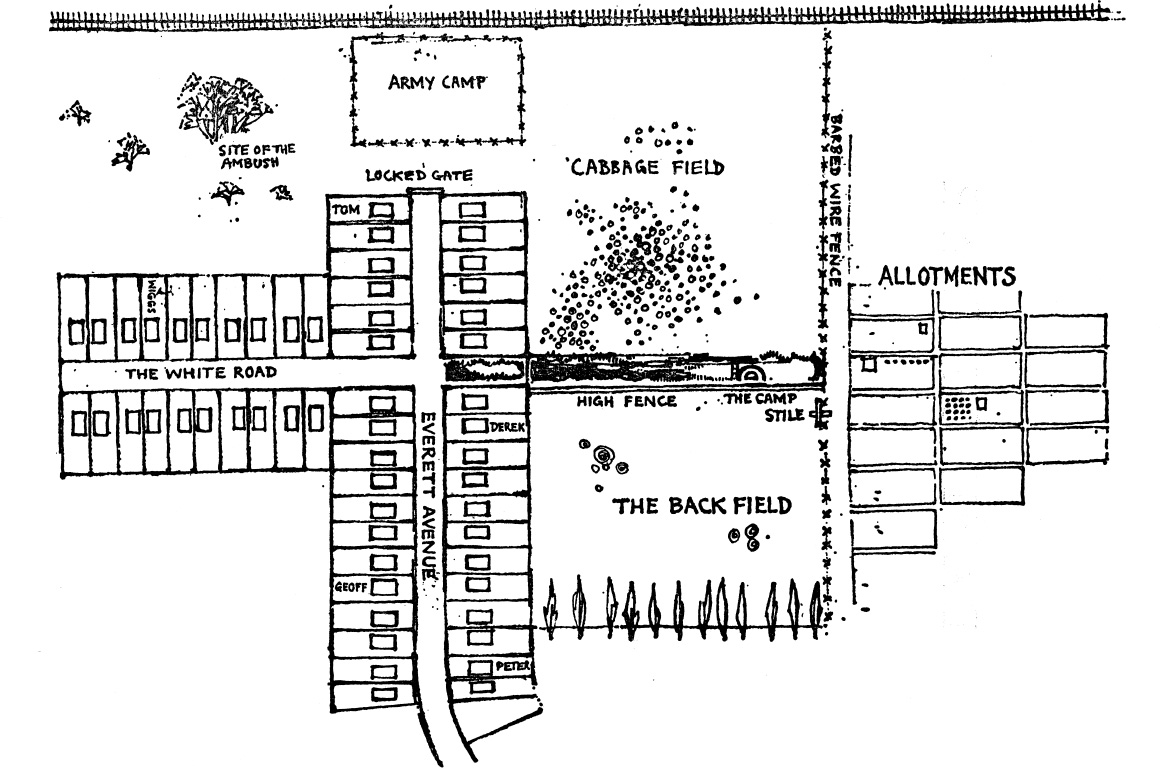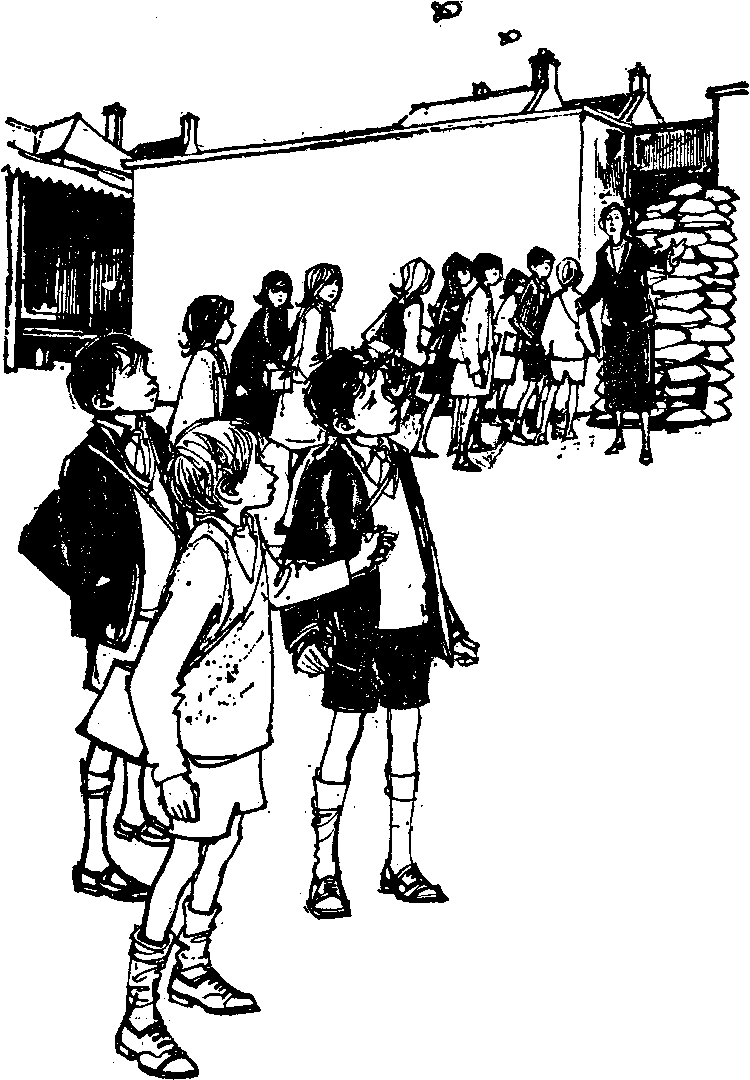Dawn of Fear
Authors: Susan Cooper



Text copyright © 1970 by Susan Cooper
Illustrations copyright © 1970 by Harcourt, Inc.
Reader's guide copyright © 2007 by Harcourt, Inc.
Â
All rights reserved. No part of this publication may be reproduced or transmitted in any form or by any means, electronic or mechanical, including photocopy, recording, or any information storage and retrieval system, without permission in writing from the publisher.
Â
For information about permission to reproduce selections from this book, write to Permissions, Houghton Mifflin Harcourt Publishing Company, 215 Park Avenue South, New York, New York 10003.
Â
Â
First Harcourt paperback edition 2007
Â
The Library of Congress has cataloged the print edition as follows:
Dawn of fear/by Susan Cooper; illustrated by Margery Gill.
p. cm.
Summary: Three English children, fascinated by the war air raids, gradually become aware of true fear and horror when they seek vengeance on an opposing gang that destroyed their hideaway.
1. World War, 1939â1945âGreat BritainâJuvenile fiction. [1. World War, 1939â1945âGreat BritainâFiction. 2. GangsâFiction.]
I. Gill, Margery, ill. II. Title.
PZ7.C7878Daw 1988
[Fic]âdc19 88-17739
ISBN 978-0-15-266201-1
ISBN 978-0-15-206106-7 pb
Â
eISBN 978-0-547-53859-4
v1.0513
Â
Â
Â
Â
for Rod
1
T
HE AIR-RAID
siren went at the beginning of the afternoon, in an English lesson, while Mrs. Wilson was reading them
Children of the New Forest.
At first they couldn't hear the siren at all for the school whistles: a chorus of alarm, their own indoor warning, shrilling down all the corridors at once.
“Ma'am, ma'am! A raid, ma'am!”
Mrs. Wilson closed the book with a deliberate snap and stood up. “All right now, children, quickly and quietly. Books in your desks, take out your gas masks, all stand up. Anybody not got his gas mask? Very good. Now I want a nice neat line to the shelter, and no running.”
A hand was waving wildly at the front of the class. “Ma'am, is it a real raid, ma'am?”
“It's a drill,” said a scornful voice.
“It's the wrong time for a drill.”
Mrs. Wilson scowled, and they knew the scowl and were quiet. “We don't know yet. Door monitor?”
Little Albert Russell was already stiff at attention by the open door, the strap of his gas-mask case neat across his chest. Out they went into the corridor, from one row of desks at a time, their double file jostling the filing classes from the other rooms, out to the air-raid shelters in the playground.
Derek and Peter had desks near the classroom window. Geoffrey was behind them.
“Can you see anything?”
“Nah. Hear the siren now, though. Listen.”
The head-splitting school whistles had stopped, and Derek listened as he walked, and heard the distant wail of the siren rise and fall until they were down the corridor and going out of the big double door. He and Peter and Geoff were nearly at the end of the line; Mrs. Wilson was counting heads just in front of them. He shivered; the sun was shining through broken clouds, but there was a chill wind. Most of the other classes, the younger ones, were made to take their overcoats into the shelters, but his group, the farthest from the cloakrooms, had no time ever to fetch theirs.
He became conscious suddenly of the drone of engines somewhere high up.
“Look!” Peter stopped, excited, pointing.
The three couples behind them fell over their feet as he stopped, and then skirted him and went nervously,
disapprovingly on. Only Geoffrey paused. The girl who had been walking with him called over her shoulder, “Come
on
,” but she was Susan Simmons, who was always bossy, and the boys took no notice, but stood where they were and stared up.
Where Peter was pointing, there was a pattern of slow-moving dots in the sky. The deep hum of the engines grew as he watched, and developed a kind of throbbing sound. The clouds were very high, and the planes were flying below them; they seemed light-colored and were not easy to see unless the sun went behind a cloud. Their noise seemed so loud now that Derek looked all around the rest of the sky for more, but saw nothing except the familiar floating shapes of the seven barrage balloons, three near, four far off, fat silver ovals hanging up there with bulbous fins at their tails, like great friendly bloated fish. The balloons were filled with hydrogen, he knew, and tethered by thick cables; they were there to get in the way of any Nazi pilot coming in low to drop his bombs.
“Junkers,” Geoffrey said confidently. “Junker eighty-eights.”
What with his own excitement and the height of the formation, Derek could not really make out the silhouette of any individual plane; but by the same token he knew that Geoff couldn't, either. “No, no,” he said. “Dorniers.”
And then in the second that they still paused on the black asphalt playground, with the grubby concrete boxes that were the air-raid shelters looming ahead of them, they saw the unbelievable happen. Suddenly the rigid, steadily advancing formation of enemy planes broke its pattern, lost its head as plane after plane broke away and dived; and they heard a new higher noise and glimpsed, diving through a broad gap in the clouds out of the sun, a gaggle of other smaller planes scattering the bombers as a dog scatters sheep. It was a furious sky now, full of coughing gunfire.

They heard other guns open up, deeper, closer, on the ground.
“Gosh!” Derek said. He had forgotten entirely where he was; he hopped in delight. His gas-mask case banged at his back. “
Gosh!
”
“Fighters, our fighters!” Peter waved madly at the sky. “Look!”
And they were lost in breathless looking and in the growing scream of engines and the thumping of gunfire, as an urgent hand came down and Mrs. Wilson dragged them off toward the shelter.
“You
stupid
boys, come under cover
at once
!” Her voice was a squeak of anxious rage, and it was only the realization that she was angrier than they had ever seen her that brought them skidding into the entrance to the shelter. But even then Peter was still staring back over his shoulder, and all at once he let out a yell of such joyful surprise that all four of them, even Mrs. Wilson, paused, hypnotized, for a last glimpse of the sky.
“He's got him, he's got him, he's got him!”
It was a HurricaneâDerek could see the blunt nose nowâand it had dived after one of the weaving bombers, with its guns making bright flashes on its wings. And the bomber had been hit: it was trailing a ragged path of black smoke behind it and lurching erratically across the sky and down. It was still firing its guns; you could hear them and see them among the puffs of smoke in the sky that were the bursts of shells fired from the ground. Nearer and nearer the ground the plane came, a long way away from them but still visible, and as it dived, it veered close to one of the motionless silver barrage balloons, and suddenly there was a sound like a soft “whoomph” and a great burst of flame.
The plane dropped and vanished, with the victorious Hurricane above it swooping off to join the battle that they could still hear but no longer see; the sound of the crash was no more than a faraway thump, like the firing of one of the anti-aircraft guns, but enough to galvanize Mrs. Wilson into thrusting them ahead of her around the right-angle bend of the entrance into the shelter itself. But still Derek had one moment's last quick sight over his shoulder of the burning barrage balloon, hanging there in the sky as it always had but beginning strangely to droop, with its fat inflated fins no longer sticking firmly out but curving gently, wearily, down.
When they came out of the shelter about half an hour later, the barrage balloon was no longer there. Instead, there was a gap in the sky and only six floating guardian
shapes. The raid had not lasted for very long; there had been time for a handful of songsâthe fourth- and fifth-grade children in their shelters had been singing “Waltzing Matilda” when they came inâand the distribution of one hard candy each. Then the noise outside, which they heard only in the brief gap between one song and the next, had died away, and the long single note of the “all clear” had shrilled out. They went back to their classrooms, in as neat a double file as before, and smartie Susan Simmons made a shocked face at Derek and Peter and Geoff and whispered to her friends as they passed.
The three boys stayed after school, hovering at their desks until everyone else had left, to apologize to Mrs. Wilson, and curiously she did no more than give them a brief lecture on the perils of being out in the open when a raid was on, and the undeniable extra crime of giving someone else the risk of coming to haul them inside.
“She's nice,” Derek said on the way home. “I mean, she could have sent us to the principal, and then they'd have told our parents, and there'd have been an awful row.”
“She ought to be grateful, if you ask me,” Peter said. “If she hadn't had to come and find us, she'd have missed all the fun.”
2
“W
E GOT
a new shelter,” Peter said, balancing on his heels on the low brick wall in the way all their parents forbade. Every house in the small road had this same brick wall enclosing its front garden: a sitting-height wall, topped with curved tile, and a chunky iron chain looped between concrete posts above that. The iron chains were supposed to go one day to the War Effort, but nobody ever came to take them away.
“Where is it?”
“In the dining room. It's an indoors one. Under the table.”
“Go on. No such thing.”
“It is. Come and see.”
They ran down the road, dodging puddles, kicking stones, jumping vainly to catch at blossoms on the fluffy pink cherry trees. No one seemed to look after the trees in the road, but every spring it happened: the dark red
buds burst into a froth of pink cotton wool, later to shed petals and brown rotting flowers on the patches of grass outside each house. Peter bounded past one tree, stumbled, and spun around clutching his foot and yelping.
“What's up?”
“Stubbed my toe. Damn, damn, damn.”
Geoffrey said primly, “You aren't supposed to say that.”
“Chickory chick, cha-la, cha-la,” Peter sang mockingly at him. “Chickory chick...”
Geoff did look a bit like a chicken sometimes, Derek reflected, with that pointy nose and the curly dark hair like feathers. He said, in experiment, “Cluck, cluck. Nice chickie.”